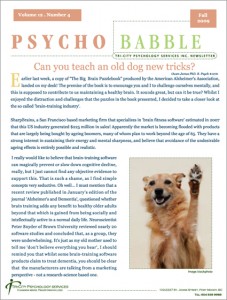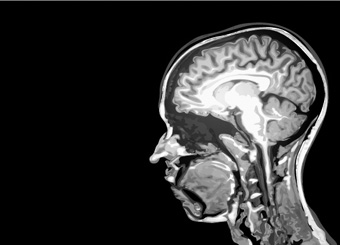Published: November 16, 2009
This morning the Boston Globe takes a look at brain training software.The quest to stop the brain drain takes a look at this growth industry.
From the moment he test-drove the brain game, Ed Johnson was riveted.
The word teasers flashing on his computer screen seemed tuned to his personal abilities. And the accompanying voice track prodded or consoled – “it actually congratulates you,’’ he said – based on his answers.
Now, the 92-year-old former management executive, an engineer by training and crossword puzzler by hobby, is scheduling computer time for fellow residents at the Fox Hill Village retirement community in Westwood. The facility just purchased a couple of these newfangled brain games and residents are lining up for 20-minute sessions. link to continue reading
 We also featured this topic in our latest Psychobabble “Can you teach an old dog new tricks“?
We also featured this topic in our latest Psychobabble “Can you teach an old dog new tricks“?
Source: Boston Globe
Published: November 16, 2009
Couples who bring thoughtful words to a fight release lower amounts of stress-related proteins, suggesting that rational communication between partners can ease the impact of marital conflict on the immune system. [continue reading…]
Published: November 16, 2009
Using four simple questions to generate client-directed feedback can greatly increase the chances that struggling couples will stay together, according to a recently published study. According to the largest clinical trial with couples to date – which was co-authored by University of Rhode Island Human Development and Family Studies Professor Jacqueline Sparks – couples that had systematic client feedback incorporated into their sessions were 46.2 percent less likely to wind up divorced or separated. [continue reading…]
Published: November 16, 2009
Brain activity changes during hypnosis, study finds
Hypnosis is increasingly being used in clinical settings, as a way of helping people lose weight or stop smoking. The National Institute for Health and Clinical Excellence (NICE) recently approved the technique for treatment of irritable bowel syndrome, but despite such endorsements there is still a great deal of scepticism about whether there really is a hypnotic state.
New research from the University of Hull, published this week in Consciousness and Cognition, however shows that hypnosis is real. Psychologists have discovered that basic brain activity undergoes change when people are hypnotised.
 Dr William McGeown and his colleagues in the department of Psychology and Centre for Clinical Neuroscience hypnotised university students and looked at brain activity, employing a technique called functional magnetic imaging (fMRI). [continue reading…]
Dr William McGeown and his colleagues in the department of Psychology and Centre for Clinical Neuroscience hypnotised university students and looked at brain activity, employing a technique called functional magnetic imaging (fMRI). [continue reading…]
 We also featured this topic in our latest Psychobabble “Can you teach an old dog new tricks“?
We also featured this topic in our latest Psychobabble “Can you teach an old dog new tricks“?
